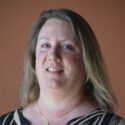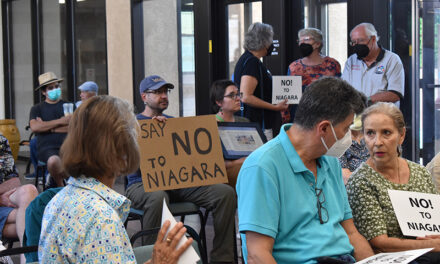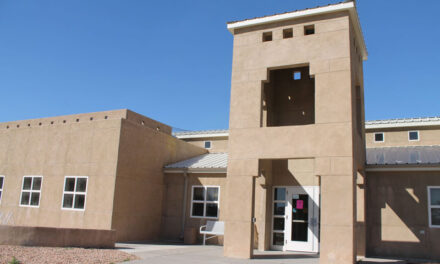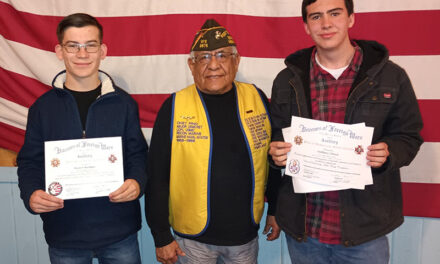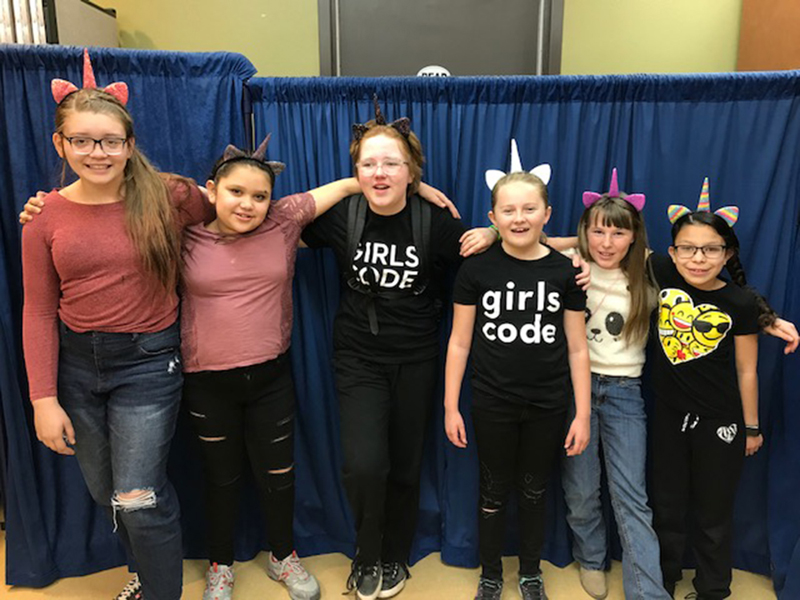
Submitted photo
Getting a chance to try on their “Girls Code” shirts, members of the Girls Who Code club, Kendal Combest, Madison Lopez, Myranda Sanchez, Kaiya Hodge and Makala Kraft, hang out at the Belen Public Library in the fall of 2019.
BELEN — There are turkeys catching feathers, penguins dodging snowflakes, sparkly unicorns, green bears and a whole host of other fun, fanciful creations.
It’s all courtesy of the Girls Who Code club at the Belen Public Library.
Started in the fall of 2019, the local Girls Who Code club is part of the library’s effort to increase technological literacy.
“We had gotten the Facebook grant for the computer learning lab and about that same time learned about a program targeted to young girls with the purpose of closing the gender gap in tech jobs,” said Belen Library Director Kathleen Pickering. “We wanted to use computer learning to improve career prospects of our community. What better way than to start while they’re young?”
The Girls Who Code program provided the library with $600 in start-up funding, provided all the curriculum and its website — girlswhocode.com — as a resource.
“I started asking moms and girls if they were interested and we got six signed up immediately,” Pickering said. “Right now we have 11 girls enrolled and a couple of them have been from the very beginning. If they continue, next fall we may have two sections — beginner and advanced.”
Pickering said there are a lot of barriers to entry into tech for women centered around confidence and vocabulary.
“There are three explicit things Girls Who Code addresses. First is coding. Second is sisterhood and support. Third is having the confidence as a woman to accomplish your goals,” the library director said. “This is about supporting them as young women. If you know the terminology, if someone asks you if you know how to code and you can say yes, that is a whole other conversation.
“It’s like girls when I was young taking auto shop so mechanics wouldn’t take advantage. We don’t want anyone to be too intimidated to participate,” she said. “About 40 percent of new jobs are in tech. It was different when a small portion of the population had tech jobs. With that changing and growing, we don’t want women to get left out.”
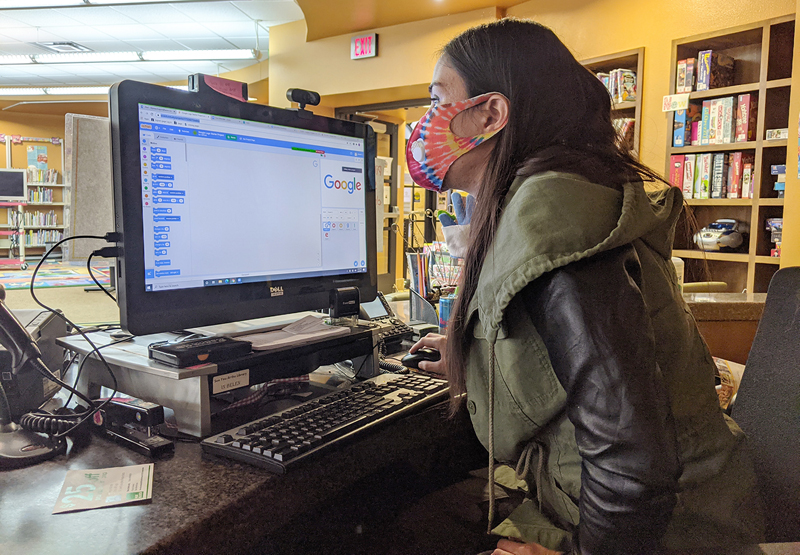
Julia M. Dendinger | News-Bulletin photo
Alyissa Aragon, the children’s librarian at the Belen Public Library, is the facilitator for the Girls Who Code weekly meetings. She leads members through coding exercises online as well as hands-on, “unplugged” activities.
According to the Girls Who Code website, only 26 percent of all computing related jobs are held by women. While 74 percent of girls asked express a desire for a career in STEM (science, technology, engineering and math) fields, only 9 percent of female graduates in 2018 actually studied a core STEM subject.
In 2012, attorney Reshma Saujani founded the nonprofit GWC to close that gap.
The GWC program also teaches workforce and career development skills, such as design and project management, programming, computer science, team building and collaboration skills.
“This program is super fun, and is not gender exclusive. Everyone is welcome,” Pickering said. “They just have to feel comfortable in a space that’s girl empowered.”
Alyissa Aragon, the children’s librarian and the Belen Public Library, is the facilitator for the GWC program.
Initially, the girls met in person, but when the COVID-19 pandemic hit a year ago, they quickly transitioned to Zoom meetings.
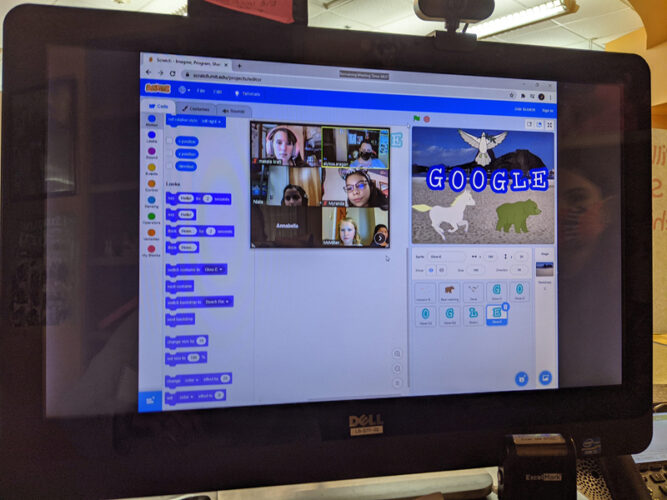
Julia M. Dendinger | News-Bulletin photo
For the next several weeks, members of the Girls Who Code club will be working on creating their own Google logo for the Google Doodle competition.
As the facilitator, Aragon guides the members through online coding projects as well as “unplugged” projects.
“The ‘unplugged’ projects are done using craft materials. They have to work through a series of steps and instructions to make something,” Aragon said. “When you’re coding, you have to be as specific as you can. When you’re talking to a computer, if you tell it to make a peanut butter and jelly sandwich and just say put the peanut butter and jelly on the bread, it’s going to put the jars on the loaf of bread. All these steps we don’t think about but in coding, you have to include them.”
Aragon said creating board games is also an exercise in coding, as the club members develop a set of rules — if this, then that sequences — and account for all possible paths and moves.
“That’s how you program and code,” she said.
Members create their projects using Scratch, a program to make video games and animation using block coding.
“Block coding are preset codes you put together,” Aragon said. “You can tell your character to glide to a particular then wait one second.”
Scratch, a project of the Lifelong Kindergarten Group at the MIT Media Lab and provided free of charge, is designed especially for ages 8 to 16 but is used by people of all ages. The program is used in more than 150 different countries and available in more than 60 languages.
Annabella Berniger, 10, joined the club last year and now that everyone is “stuck at home,” has stuck with the activity.
Fifth-grader Myranda Sanchez said she enjoys coding because she can make things you can’t really do in real life. For instance, she created a game featuring a penguin of her own original design.
In the game, the player controls the side-to-side movements of the penguin, dodging snow flakes, which loses points, while trying to catch the falling fish to earn points.
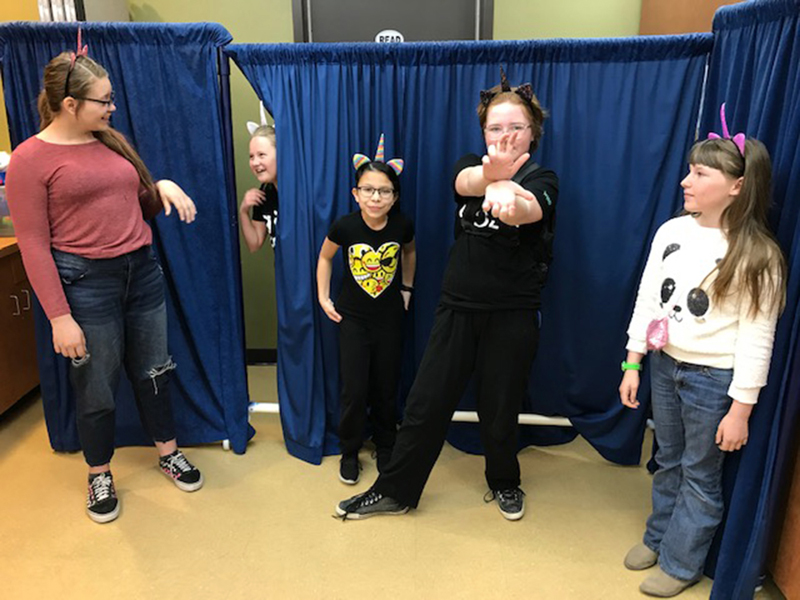
Submitted photo
Before the pandemic, members of the local Girls Who Code club, Kendal Combest, Alyssia Marin, Kaiya Hodge, Madison Lopez, Makala Kraft and Myranda Sanchez, were able to meet in person. Now they work on projects in Zoom meetings.
The members of GWC use a program called Piskel to create custom characters they can make come alive in video games and animations done in Scratch. Piskel is a free, online editor for animated sprites and pixel art.
The club members are currently using Scratch to design their own Google logo for the annual Doodle for Google competition. The winner receives a $30,000 college scholarship and Google gear.
“They also win $50,000 for their school or local nonprofit,” Aragon says, gesturing broadly around the library. “I’m just saying.”
Anyone interested in joining the Girls Who Code program can call the Belen Public Library, 966-2600, or visit girlswhocode.com.
Julia M. Dendinger began working at the VCNB in 2006. She covers Valencia County government, Belen Consolidated Schools and the village of Bosque Farms. She is a member of the Society of Professional Journalists Rio Grande chapter’s board of directors.
